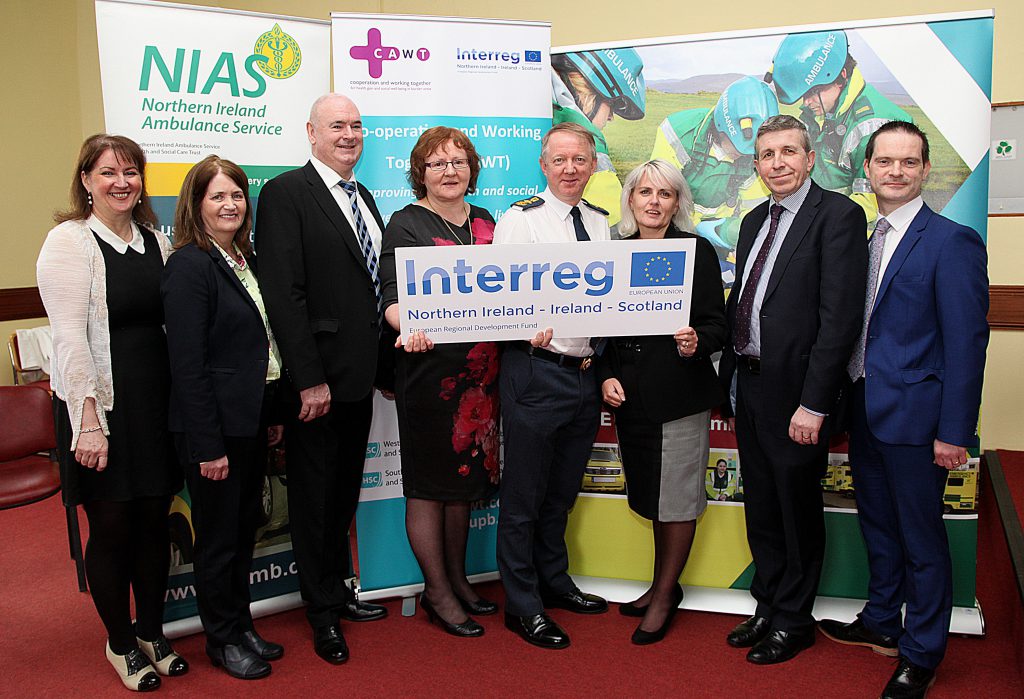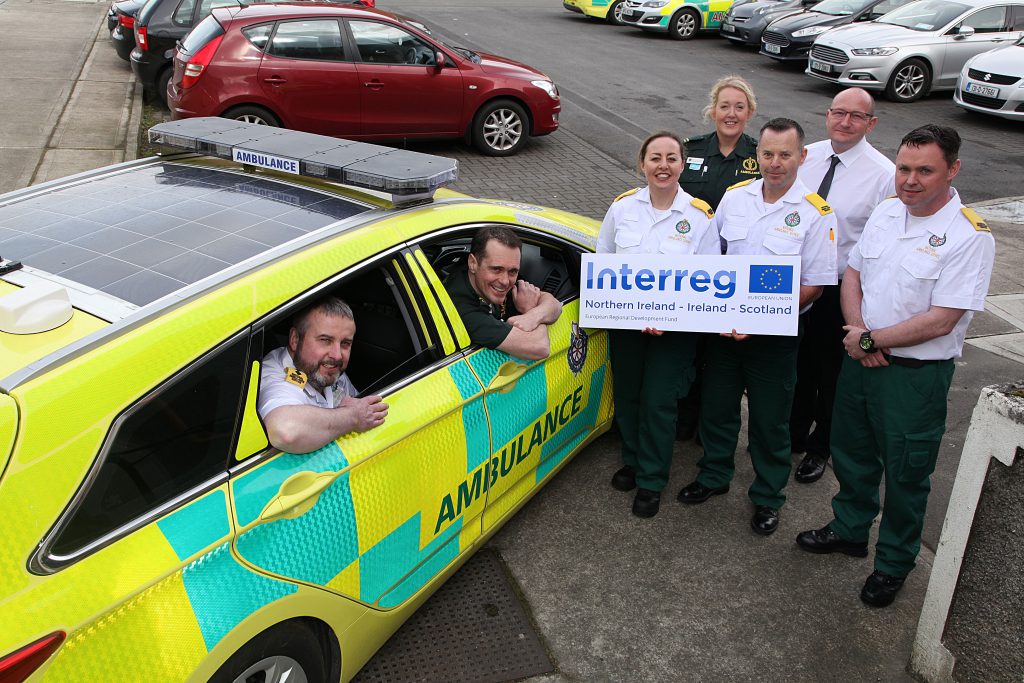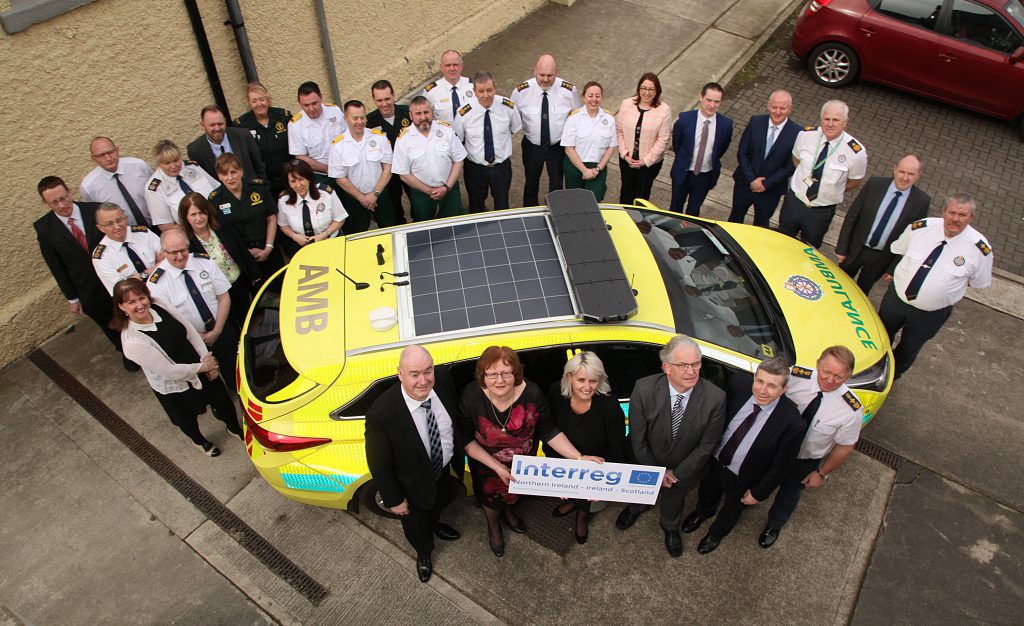30th March 2018
Northern Ireland, Republic of Ireland and Scotland to benefit from Community Paramedic services to enable care to be provided closer to a patient’s home
This week has seen the formal launch of the €1.1 million EU INTERREG VA funded cross border Community Paramedic Project. Tony O’ Brien, Director General of the Republic of Ireland’s Health Service Executive (HSE), was joined by representatives from the Northern Ireland Ambulance Service, the Scottish Ambulance Service and the HSE’s National Ambulance Service at the launch in Dublin.
This new collaboration between the three national ambulance services has been warmly welcomed and has resulted in the establishment of Community Paramedic services in Northern Ireland and the Republic of Ireland. Community Paramedics associated with this project are undergoing specialised training accredited by Glasgow Caledonian University. The project has recently commenced and is enabling Community Paramedics to provide safe and effective care to patients in their own homes and communities and is already reducing unnecessary ambulance transports to emergency departments.

Pictured (from left to right) are: Bridget Clarke and Louise Potts, Cross Border CAWT Acute Project; Brian McNeill, Director of Operations, NI Ambulance Service; Bernie McCrory, Chief Officer, CAWT cross border health; Martin Dunne, Director, National Ambulance Service (Rep of Ireland); Wendy Quinn, Head of Service, Scottish Ambulance Service; Sean Murphy, General Manager, Letterkenny University Hospital and Michael Rooney, HSE.
The Co-operation and Working Together (CAWT) Health and Social Care Partnership in collaboration with the Scottish Ambulance Service, the Northern Ireland Ambulance Service and the National Ambulance Service in the Republic of Ireland developed the Community Paramedic Project bid for EU INTERREG VA funding which was successful in securing €1.1 million for an 18 month period.
The Project will target specific patient populations in remote and rural areas / border areas of the three regions. The four pilot localities which have been identified for this scheme include Castlederg, Co Tyrone in Northern Ireland; Buncrana, Co. Donegal and Clones, Co. Monaghan in the border region of the Republic of Ireland; and the Argyle & Bute region in SW Scotland.
In addition to providing Community Paramedic training to eligible individuals, the EU funding is being used to invest in new rapid response vehicles for the pilot areas in the three ambulance regions. These vehicles are fitted out specifically to provide care to patients in their homes or their community. This means that, within the pilot areas, more patients can be treated at home instead of having to be transported by ambulance to hospital emergency departments.
Commenting on this initiative, Michael Bloomfield, Chief Executive of the Northern Ireland Ambulance Service said: “At a time when Health and Social Care is experiencing unprecedented demand which manifests itself in extreme pressure in Emergency Departments, the Northern Ireland Ambulance Service is delighted to be participating in this initiative enabling Paramedics to work closely with other healthcare professionals within rural and border area communities. The greatest benefits will be felt by patients themselves who will receive the appropriate assessment and treatment in their homes, if admission to hospital is not the deemed appropriate. NIAS welcomes the introduction of this enhanced Paramedic role as it offers an excellent opportunity for career progression for staff.”

Community Paramedics participants from the Northern Ireland Ambulance Service, the Scottish Ambulance Service and the Republic of Ireland’s National Ambulance Service who are undergoing specialist training as part of the €1.1 million EU INTERREG VA funded CAWT cross border Community Paramedic Project. In the vehicle (left to right): Mark Sheerin, Community Paramedic, Buncrana Primary Care Centre and Damian Muldoon, Community Paramedic, Castlederg Primary Care Centre. Standing at the front (left to right): Anne McDermott, Community Paramedic, Buncrana Primary Care Centre; Brendan Finan, Community Paramedic, Clones GP Practice and Declan Smith, Community Paramedic, Clones GP Practice. Standing at the back (left to right): Caroline French, Community Paramedic, Castlederg Primary Care Centre and Scott Ramsey, Community Paramedic, Scottish Ambulance Service.
Speaking at the launch event in Dublin, Tony O’Brien, Director General of the HSE welcomed this new initiative, which allows Paramedics to broaden the routine healthcare services they provide and will help to improve rural urgent medical services. He said: “Emergency Care pressures are a constant challenge for all health systems in Europe. This innovative project, enabled by EU funding and collaboration with other member states, is a good example of how we can ensure patients receive the right care in the right place while also easing some of the pressures on our Hospital Emergency Departments. I have no doubt that it will be successful and that we will be rolling it out across Ireland as a key part of our Urgent and Emergency Care system in the coming years.”
Welcoming the project Gina McIntyre, CEO of the Special EU Programmes Body said: “The EU’s INTERREG VA Programme provides funding to organisations that can implement joint cross-border solutions to issues that affect citizens living in the border region. This project, involving ambulance services working together, will enhance the health and social care of citizens living in more rural and isolated areas and will enable the transition from tra
ditional institution-based service provision to a more community-based approach.”
The launch was attended by project participants and stakeholders from all three regions.
Match-funding for the project has been provided by both Departments of Health in Ireland and Northern Ireland and by the Scottish Government.

NI Ambulance Service (NIAS) Community Paramedics at the launch of the €1.1 million EU INTERREG VA funded CAWT cross border Community Paramedic Project involving the Northern Ireland Ambulance Service, Scottish Ambulance Service and the Republic of Ireland’s National Ambulance Service. Pictured are Damian Muldoon and Caroline French, Community Paramedics from Castlederg Primary Care Centre, Co. Tyrone.

NI Ambulance Service (NIAS) representatives at the launch of the €1.1 million EU INTERREG VA funded CAWT cross border Community Paramedic Project involving the Northern Ireland Ambulance Service, Scottish Ambulance Service and the Republic of Ireland’s National Ambulance Service. Pictured (from left to right): Caroline French, Community Paramedic, Castlederg Primary Care Centre, Co.Tyrone; Brian McNeill, Director of Operations, NIAS; Laura Coulter, Area Manager, Altnagelvin Ambulance Station, NIAS; Frank Orr, Assistant Director, NIAS and Damian Muldoon, Community Paramedic, Castlederg Primary Care Centre, Co.Tyrone.

